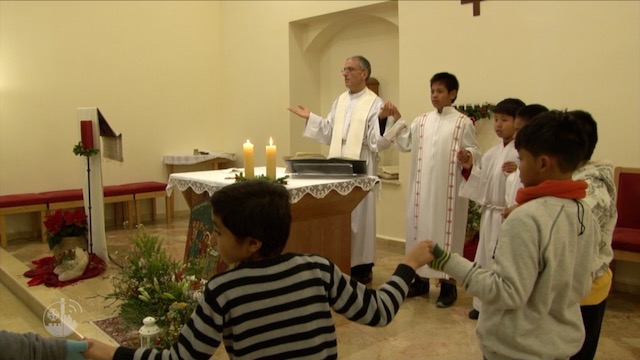A personal parish came into force on 20 May. This is an attempt to respond to the urgent spiritual and social needs of these peoples.
For some years now the ecclesial community in Jerusalem has seen the significative presence of thousands of foreigners in the celebrations of the life of the Church. They come from the Philippines, India, Senegal and many other other countries. Over time a pastoral service for these groups was born. And in April the Apostolic administrator of Jerusalem Mgr Pierbattista Pizzaballa announced the creation of a personal parish. The Coordination for the pastoral care of migrants and refugees becomes an Episcopal Vicariate for migrants and refugees”.
Fr RAFIC NAHRA
Coordinator of the Pastoral care for Migrants
“I believe the main thing we need to remember is that these people arriving here are really our brothers and sisters in the true sense of the word. Even if they remain only for a few years, we need to welcome them and help them to integrate. Many asylum-seekers cannot return home. We need to help them find their place. This is the mission of the Church…”
The current coordinator of the Pastoral care for Migrants explains what a personal parish menas. According to the Code of Canon Law it is a term used to designate a specific parish identified amongst other things by rite, language and nationality.
Fr RAFIC NAHRA
Coordinator of the Pastoral care for Migrants
“This will not be a territorial parish. Usually parishes find themselves in a specific place: Jaffa, Jerusalem, Ramleh…this is not a territorial parish, but a personal one, as it gathers a group of persons, in our case migrants. All those in this situation as migrants and asylum seekers belong to it. All those working with them know their situation and how to help effectively.
Under this specific profile we identify migrant men and women who have left their country due to financial difficulties or to escape wars and dictatorships. At this time they have no guarantee regarding their future in Israel, but the objective of the Vicariate is to continue to strengthen the services offered by the Pastoral Care for Migrants.
Fr RAFIC NAHRA
Coordinator of the Pastoral care for Migrants
“Our work is aimed mainly at children and young adults, as this is a fragile age group (…). We have nurseries and after school programs for children from 4 to 12 years of age. In Tel Aviv there is a group of young people we are trying to keep close to the Church as they lif in very difficult neighbourhoods. In south Tel Aviv there are many cases of drug use, prostitution and great poverty. We try to protect these young people and keep them close to the Church.”
The date of the canonical institution of the personal parish is on 20 May, the solemnity of Pentecost. An Episcopal Vicar will also be nominated in order to structure its functioning. One thing is certain: from this date it will be easier to accompany the faithful or administer baptism and matrimony. For the local Church this is a crucial step forward in supporting the life of faith of migrants.


